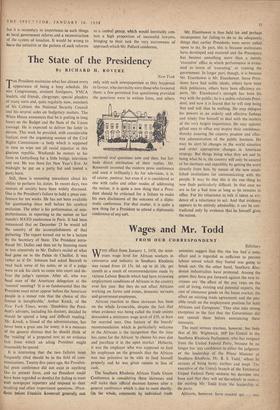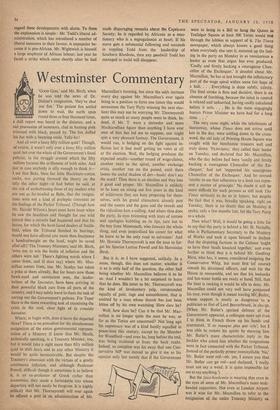Wages and Mr. Todd
FROM OUR CORRESPONDENT WITH effect from January 1, 1958, the mini- mum wage level for African workers in commerce and industry in Southern Rhodesia was raised from £4 155. 6d. up to £6 10s. per month as a result of recommendations made by various Labour Boards which had been reviewing employment conditions of Africans in the country over last year. But they do not affect Africans working on farms and mines, domestic servants and government employees.
African reaction to these increases has been on the whole favourable, despite the fact that when evidence was being called the trade unions demanded a minimum wage level of £10, at least for married men. One feature of the boards' recommendation which is particularly welcome to the Africans is the recognition that the time has come for the African 'to choose his own diet and purchase it in the open market.' Hitherto, it was the employer who was supposed to feed his employees on the grounds that the African was too primitive to be able to feed himself. properly and he was given rations in lieu of cash.
The Southern Rhodesia African Trade Union Conference is considering these increases and • will' make their official decision known after a general conference which is due to meet shortly. On the whole, comments by individual trade Salisbury unionists suggest that this rise has had a tonic effect and is regarded as sufficient to prevent labour unrest which they feared was going to break out. On the other hand, Southern Rho- desian industrialists have protested. Among the points they have put forward against the new in- creases are 'the effect of the pay rates on the cost of living, existing and potential exports, the cost of consumer goods on the home market, the effect on existing trade agreements and the pos- sible result on the employment position for both Africans and Europeans.' They also take strong exception to the fact that the Government did not consult them before announcing these measures.
The most serious reaction, however, has been that of Mr. Wightwick, MP for Umtali in the Southern Rhodesia Parliament, who has resigned from the United Federal Party, because he no longer has 'any confidence in either the judgment or the leadership of the Prime Minister 01 Southern Rhodesia, Mr. R. S. Todd,' whom he accuses of being hasty, tactless and inept. The executive of the UMtali branch of the Territorial United • Federal Party endorse 'his decision and have said that they will set -the:wheels in motion for ousting. Mr: .Todd from the leadership ol the party.
Africans, however, have reacted qui and regard these developments with alarm. To them the explanation is simple : Mr. Todd's liberal ad- ministration, which has introduced a number of liberal measures in their favour, is unpopular be- cause it is pro-African. Mr. Wightwick is himself a large employer of African labour; last year he faced a strike which came shortly after he had made disparaging remarks about the 'Capricorn Society; he is regarded by Africans as a reac- tionary who is a segregationist at heart. If his move gets a substantial following and succeeds in toppling Todd from the leadership of Southern Rhodesia, then any goodwill Todd has managed to build will disappear.



































 Previous page
Previous page